The exponential growth of the digital world over the years has taken e-commerce to a new level where it is no longer just a tool for sales but a way to expand the business.
WordPress, which currently supports over 40% of all websites in the world, is a platform that aspiring businessmen choose to create their brand’s first web representation.
WordPress eCommerce plugins have become more complex and developed to suit the complex needs of modern eCommerce businesses, which are more than just the selling of products.
Regardless of whether you are a small business owner, a new-age digital entrepreneur, or an existing brand who wants to diversify your online sales, the right WordPress eCommerce plugin can act as the key to your success.
Along with these, WordPress Affiliate Plugins can further enhance your marketing efforts by streamlining affiliate management and boosting referral-driven sales.
These plugins provide all or almost all functions you may need, from mere payment processing to multiple inventory management capabilities, marketing connections, to even analytical tools.
What are the e-commerce plugins of WordPress?
WordPress eCommerce plugins are specific software applications that transform a simple WordPress website into a full-blown, functioning eCommerce marketplace. They are integrated with WordPress and that is why the owners of these sites can implement product databases, checkouts, payment solutions, stock control, and many other requisite functionalities of an eCommerce system with a bare minimum of programming. WooCommerce is a well-known plugin for WordPress e-commerce, and it seems that it can have some advantages both for the store owner and the buyer.
WordPress eCommerce plugins offer numerous advantages for online businesses:
- Easy Setup: As we shall shortly see, most of the plugins are quite simple to use and most of them come with installation wizards.
- Cost-Effective: All the plugins that have been listed in this paper have free and fully working versions of the plugins which include most of the powerful functionalities of the plugin.
- Flexibility: Many options to help you match your logo
- Payment Integration: Payment through different gateways and methods
- Inventory Management: Another advantage of using a learning analytics tool is that there is enhanced identification and assessment of the student’s performance.
- Marketing Features: Engraved with discount, coupon along with the promotion facility
Comparison Table
| Plugin | Why Useful | Free Plan Available | Best For |
| WooCommerce | Open-source with full flexibility for small and large businesses, supports physical and digital products. | Yes | Small to medium enterprises, startups, online stores. |
| Easy Digital Downloads | Tailored for selling digital products like software, e-books, and music. | Yes | Bloggers, software developers, writers, musicians. |
| MemberPress | Focuses on membership and subscription-based sales with flexible access control and recurring payments. | No | Bloggers, educators, trainers, subscription-based businesses. |
| BigCommerce | A robust solution for multi-channel selling with integration into WordPress and advanced eCommerce features. | No | Multichannel sellers, growing businesses, large enterprises. |
| Shopify WordPress Integration | Leverages Shopify’s powerful eCommerce tools while keeping WordPress flexibility. | No | Internet stores, businesses seeking advanced eCommerce solutions. |
| WP Simple Pay | Simple payment forms via Stripe, ideal for consultants and freelancers. | Yes | Solo workers, freelancers, service providers. |
| WC Vendors | Turns WordPress into a marketplace with multi-vendor management and commission models. | No | Marketplace creators, multi-vendor eCommerce platforms. |
| Ecwid | Easy-to-install and free plan with multi-channel selling capabilities. | Yes | Small businesses, new entrants, virtual sellers. |
| WP EasyCart | All-in-one solution with reporting tools and support for multiple payment gateways. | Yes | Startups, SMBs, retailers, merchants seeking easy-to-use solutions. |
| WPForms | Drag-and-drop form builder with payment processing functions, ideal for service-based businesses. | Yes | Service providers, event organizers, booking services. |
| MonsterInsights | Integrates Google Analytics for detailed eCommerce tracking and reporting. | No | Marketing organizations, data-driven businesses. |
| FunnelKit Automation | Focuses on automated marketing campaigns and customer tracking for advanced sales strategies. | No | Marketing-oriented companies, eCommerce businesses with complex needs. |
Top 12 WordPress E-commerce Plugins
1. WooCommerce

WooCommerce remains an eminent WordPress eCommerce plugin; it is used to power more than 30% of online stores. Below, this open-source platform provides the highest level of flexibility and adjustability for any company. From the small business owner with a startup eCommerce store to the large-scale enterprise with complex supply chain systems, WooCommerce has the solution to selling physical and digital products, tracking and managing stock, accepting payments, and providing an easy-to-use checkout system.
Key Features:
- Unlimited product uploads
- Support for more than one payment gateway
- High-end micro inventory control system
Pros:
- Completely free to start
- Large-scale community and extension marketplace
- Highly flexible with the ability to support large amounts of data
Cons:
- Often can become intricate when multiple extensions are added
- Locally hosted sites may lag due to add-ons
- Has some advanced setting options that are best used when you have some technical background.
Ideal For:
- Small to medium enterprises, start-ups,s and online stores stocking tangible and intangible merchandise.
Pricing:
- Freebasee plugin
- Extensions range from $0-$299
Website: https://woocommerce.com/
2. Easy Digital Downloads (EDD)

It is a basic digital download plugin that is geared towards the sale of digital goods hence making it the most preferred WordPress e-commerce plugin for people selling things such as software, e-books, music, and downloads. Compared to most other eCommerce platforms, Estimated date of delivery is developed for selling only digital goods; therefore, it is the most appropriate solution for both of them.
Key Features:
- The safe download of control files
- Every single sales and earnings report
- Multiple payments gateway integration
Pros:
- Mobile and oriented on digital goods.
- Simple user interface
- Extensive extension library
Cons:
- Less appeal particularly for a physical product
- Once more, some added features are attainable only with the help of paid plugins again.
- Not very flexible when compared with WooCommerce.
Ideal For:
- Bloggers, software applications developers, writers, and singers
Pricing:
- All Access Pass: $499.5/year
- Professional: $299.55/year
Website: https://easydigitaldownloads.com/
3. WordPress Ecommerce Plugins – ReferralCandy

ReferralCandy helps eCommerce businesses drive sales through referral marketing. By leveraging existing customers to refer friends, stores can grow their customer base organically and cost-effectively. It integrates seamlessly with WooCommerce and other WordPress-based stores, allowing merchants to automate referrals, track customer incentives, and customize their program to fit their brand.
Key Features:
- Automates customer referral rewards
- Customizable referral incentives (cash, discounts, store credits)
- Fraud detection and analytics to prevent abuse
- Integration with WooCommerce and other major eCommerce plugins
Pros:
- Increases word-of-mouth sales
- Fully automated referral tracking and rewards
- Works with Shopify, WooCommerce, BigCommerce, and Magento
Cons:
- Requires an active customer base to see results
- Monthly pricing may not suit all small businesses
Ideal For: Shopify & WooCommerce store owners looking to scale through word-of-mouth marketing.
Pricing: Starts at $59/month with a commission-based model for growing stores.
Website: https://www.referralcandy.com/
4. MemberPress
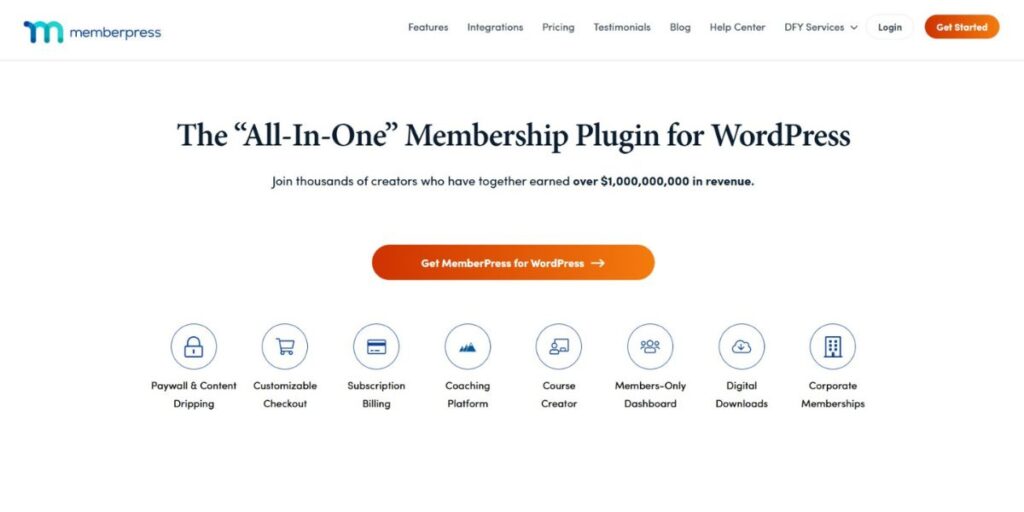
MemberPress reshuffles WordPress eCommerce in as much as it only focuses on membership and subscription styles of sale. By using this relatively simple plugin, bloggers, teachers/trainers, and other virtual business people can easily convert their knowledge into revenue streams by offering restricted access content, paid subscriptions, and complete total membership solutions.
Key Features:
- Some of the access rights to the content are selective.
- Recurring payment support
- Better management at the member level
Pros:
- Perfect for online courses and for creating tiered subscription-based websites.
- The last right is flexibility in managing the content blocked on the platforms.
- Seamless payment integration
Cons:
- Steeper learning curve
- May be a problem for novices
- This product is a bit costly when compared to certain other brands of similar make in the market.
Ideal For:
- Web-based teachers, trainers, and managers of paid subscription websites
Pricing:
- Pro: $399.50/year
- Plus: $299.50/year
- Basic: $179.50/year
Website: https://memberpress.com/
5. BigCommerce

BigCommerce is a well-ranked hosted and self-hosted WordPress e-commerce plugin and a standalone hosted system with integration with WordPress. This has eradicated the old issue of a WooCommerce or a WordPress site having all the disadvantages of an ordinary online store and not having the flexibility of other e-commerce platforms. It facilitates the users to update the product database, inventor,y, and other aspects of BigCommerce’s sophisticated eCommerce applications in the WordPress platform.
Key Features:
- This capability is a real-time update capability of the product catalog to the actual product pictures that a seller has on the ground.
- Specialized for multi-channel selling However simple the business’s sales plan is multichannel selling experience puts the business in a better position than other contenders with similar production capabilities.
- Automated shipment and tax accounting
Pros:
- Business tools that may be relevant to any size of a business from a small to a large one
- Zero transaction fees
- Integration to WordPress
Cons:
- Monthly subscription costs
- Limited theme customization
- Improbable for extremely small firms
Ideal For:
- Smaller growing-up merchants, multichannel selling merchants, and large businesses that seek reliable solutions
Pricing:
- Contact For Pricing
Website: https://www.bigcommerce.com/
6. Shopify WordPress Integration

While it is not a WordPress eCommerce plugin by default, Shopify’s third-party app solutions have thus portrayed it as a proposition to merchants seeking a sound solution for their eCommerce. Shopify WordPress connection extent allows about users to leverage the valuable and stronge-commerce of the Shopify while helping to keep WordPress flexible and fabulous and control its contents.
Key Features:
- Multichannel selling support
- AI-based product description utilities
- Advanced inventory management
Pros:
- Sound eCommerce support
- User-friendly interface
- Extensive app ecosystem
Cons:
- Additional transaction fees
- It is based on third-party integration plugins.
- Monthly subscription costs
Ideal For:
- Internet stores, businesses that are in the process of seeking the best eCommerce solutions
Pricing:
- Basic: ₹1,499/month
- Shopify: ₹5,599/month
- Advanced: ₹22680/month
- Plus: ₹1,75,000/month
Website: https://www.shopify.com/
7. WP Simple Pay
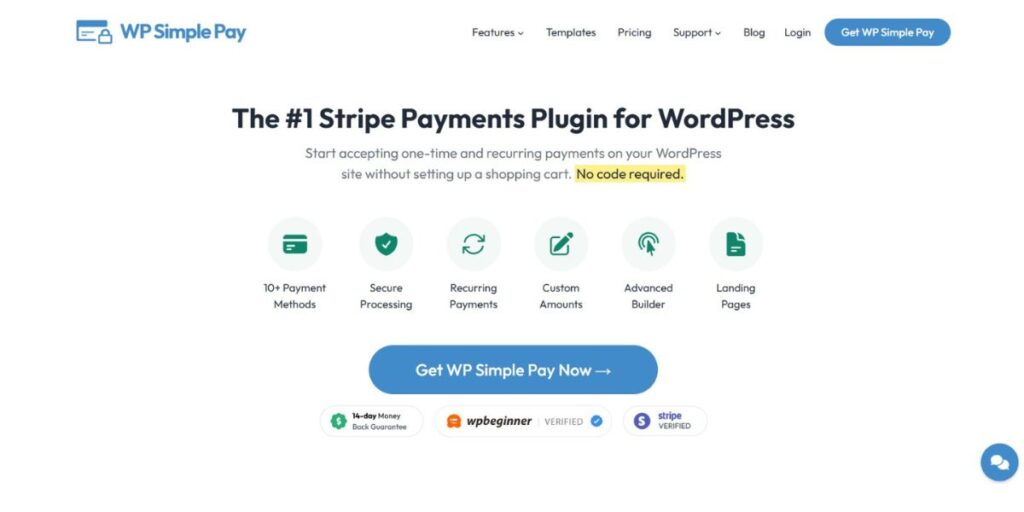
WP Simple Pay is an easy-to-use solution to WordPress eCommerce plugins, made specifically for companies that offer a handful of products, or only services. This plugin focuses on building elegant and minimalistic payment forms connected to Stripe and is perfect for consultants, freelancers, and various other service providers who do not need a complex payment page. In contrast to extensive eCommerce plugins, WP Simple Pay targets ease of use and simplicity.
Key Features:
- Drag-and-drop form builder
- Recurring payment support
- Custom field options
Pros:
- Quick and easy setup
- No complex shopping cart solutions
- Secure Stripe integration
Cons:
- Applicable only to simple payment contexts
- It is not very suitable when dealing with a large and complex product list.
- Primarily Stripe-focused
Ideal For:
- Solo workers, independent contractors, business services providers, easy bill received
Pricing:
- Elite: $299.50/year
- Professional: $199.50/year
- Plus: $99.50/year
- Personal: $49.50/year
Website: https://wpsimplepay.com/
8. WC Vendors
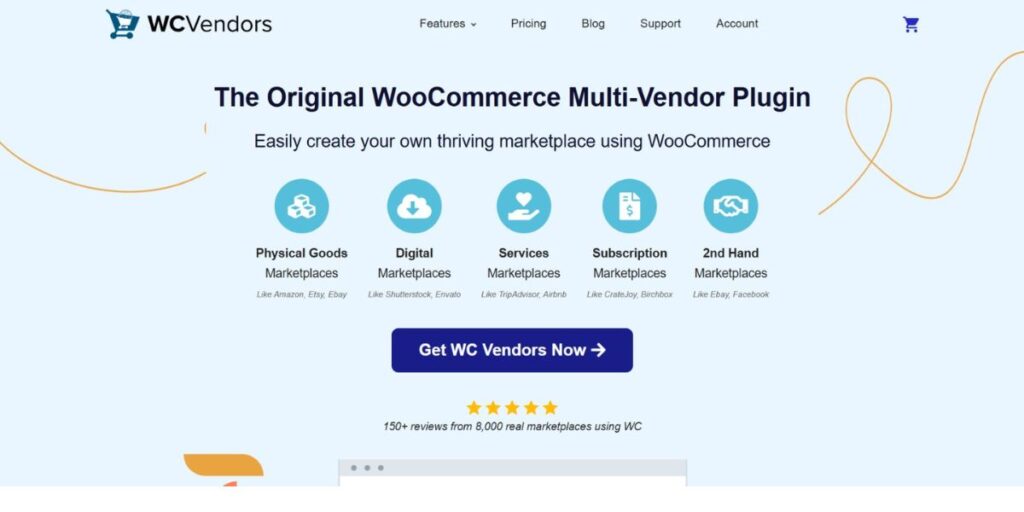
WC Vendors turns any WordPress eCommerce Plugin into a full-fledged marketplace where webmasters can build sites like Etsy or Amazon. Developed as a WooCommerce extension, this plugin enables multiple vendors to upload and manage their products under one WordPress site making it an ideal tool for building online marketplaces.
Key Features:
- Multi-vendor management
- Sustainable commission models
- Vendor performance tracking
Pros:
- Enables marketplace creation
- Comprehensive vendor tools
- Independent WooCommerce integration
Cons:
- Requires WooCommerce
- Complex setup process
- Extra costs for extra functionality
Ideal For:
- Some examples of the marketplace’s creators, multi-vendor eCommerce platforms
Pricing:
- Business: $299.50/year
- Growth: $159.60/year
- Pro: $99.50/year
Website: https://www.wcvendors.com/
9. Ecwid

Ecwid is also unique amongst WordPress eCommerce plugins as a free, premium plugin that is suitable for all types of companies.
This is the major strength of the application since customers can start selling their products online without incurring any transaction costs, especially if they are starting businesses and those with limited capital to start online selling.
To further enhance customer engagement and boost sales, integrating WordPress Email Marketing Plugins can help automate email campaigns and keep customers informed about offers and updates. Ecwid is very easy to install – it combines perfectly with the WordPress platform, with an enhanced user interface that makes it easy to set up an online store.
Key Features:
- Multichannel selling support
- Gutenberg block integration
- EUGDPR-compliantt store management
Pros:
- The free lite plan allows for up to 5 products.
- No transaction fees
- Easy cross-platform selling
Cons:
- Some of the features not available in the free version of the software
- Lack of digital product support is provided in the free plan.
- Additional and more professional functions are available only with paid subscriptions.
Ideal For:
- Small business people, new entrants, virtual sellers
Pricing:
- Free: $0
- Venture: $21/month
- Business: $39/month
- Unlimited: $89/month
Website: https://www.ecwid.com/
10. WP EasyCart
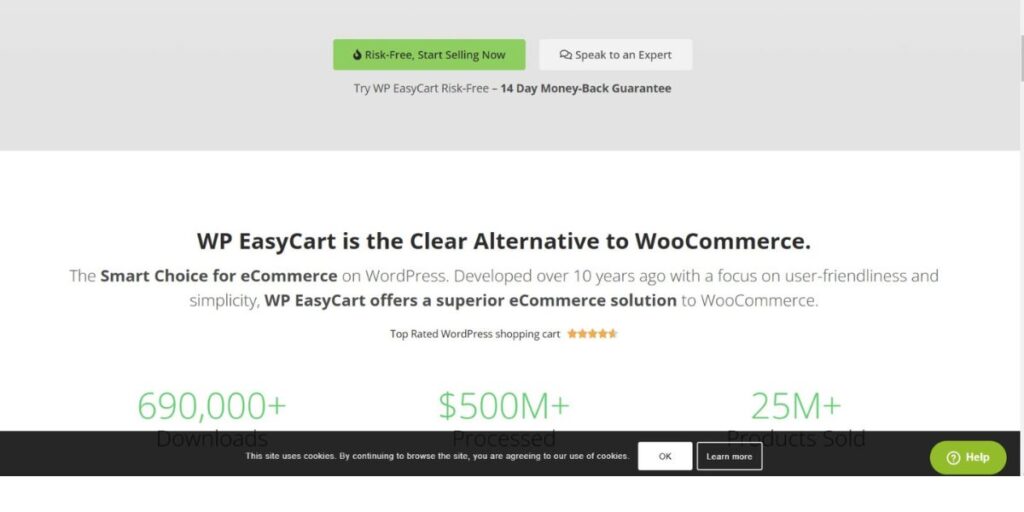
WP EasyCart rises as an all-in-one WordPress eCommerce plugin which is an excellent solution to WooCommerce. Its user-friendly interface coupled with a wide array of features makes it ideal especially for businesses that require a no-nonsense online selling platform. The plugin comes with a full-blown solution to e-commerce with features for managing products, checkout, and store design. Another thing that was developed in WP EasyCart is the reporting function which includes detailed reports.
Key Features:
- Detailed sales reporting
- Supports for multiple payment gateways
- PCI compliance management
Pros:
- Comprehensive reporting tools
- WooCommerce product importer
- Caching compatibility
Cons:
- In free versions, the number of marketing features is small.
- Not as flexible as WooCommerce
- Some of the options are available only if you upgrade your account to the premium version.
Ideal For:
- Start-ups, SMBs, retailers, and merchants looking for granular insights
Pricing:
- Free: $0/year
- Premium: $89/year
- Pro: $69/year
Website: https://www.wpeasycart.com/
11. WPForms
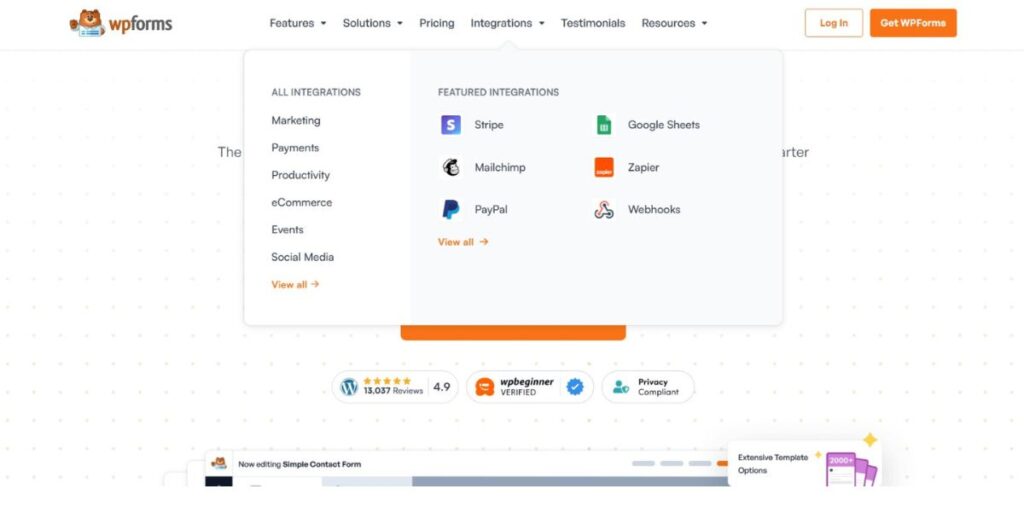
Originally, WPForms was just a form builder, but the plugin has grown and become one of the best WordPress eCommerce plugins with robust payment processing functions. Its approach enables businesses to develop specific payment forms for this selling context, for instance, the payment of goods and services, and service booking, among others. This drag-and-drop form builder makes it relatively easy for anyone including those who have poor programming skills.
Key Features:
- 2,000+ form templates
- Multiple Payment gateway integration
- Abandoned form recovery
Pros:
- Extensive form customization
- There are absolutely no transaction fees on all paid plans.
- User journey reporting
Cons:
- 3% transaction fee on the free version
- Few choices for payment foremost used selling technique is the form-based selling approach
Ideal For:
- Some of the people who can benefit from the research are the service deliverers, event organizers, and less of digital products.
Pricing:
- Elite: $299.50/year
- Pro: $199.50/year
- Plus: $99.50/year
- Basic: $49.50/year
Website: https://wpforms.com/
12. MonsterInsights
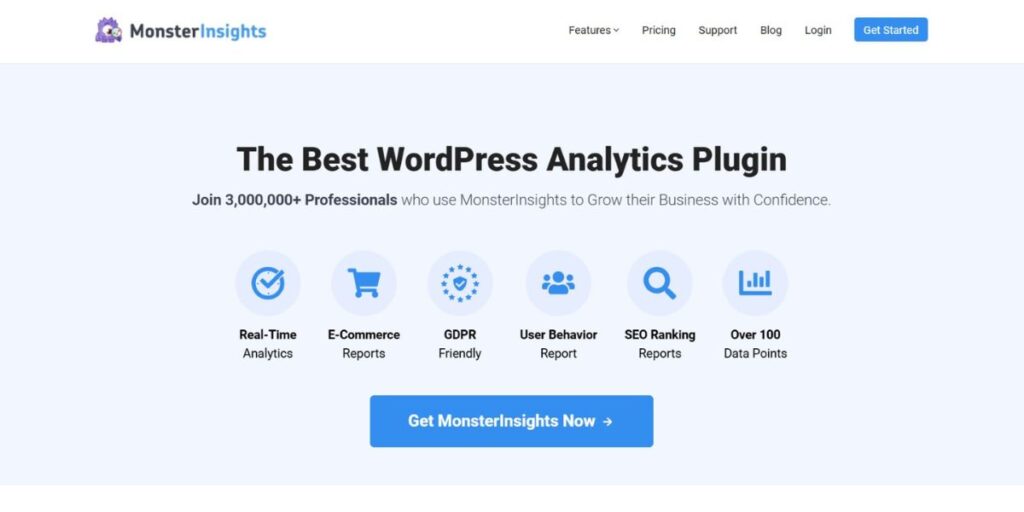
MonsterInsights moves WordPress eCommerce plugins from basic analytics to being fully integrated with Google Analytics. This plugin is not just a simple reporting tool but it provides detailed analysis of all the aspects of the stores and customers and conversion ratios. The creation of a user-friendly front end means that Bubusiness easily performs sophisticated analyses.
Key Features:
- Google Analytics integration
- eCommerce tracking
- Real-time analytics reporting
Pros:
- Easy no-code setup
- Detailed eCommerce reporting
- EU compliance features
Cons:
- Some of the features are available only in the Pro version of the app.
- Concentrating more on the analysis side, not necessarily the sales side
- Extra expense for tracking all parameters
Ideal For:
- Marketing organizations and industries, data-driven businesses.
Pricing:
- Agency: $399.50/year
- Pro: $199.50/year
- Plus: $99.50/year
Website: https://www.monsterinsights.com/
13. FunnelKit Automation
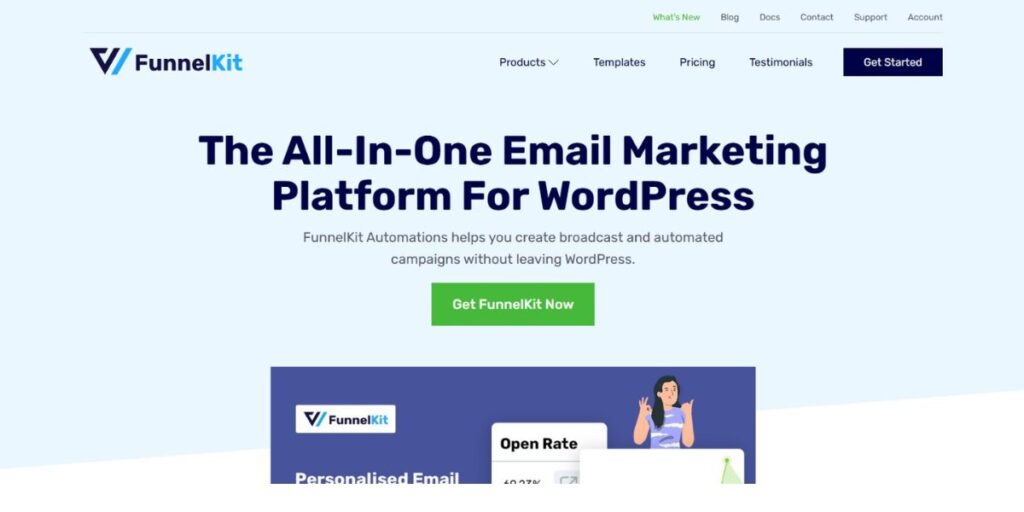
FunnelKit Automation is the future of WordPress eCommerce plugins, which target customer relations and marketing. Unlike most eCommerce solutions which are quite limited, this plugin offers a suite of tools for targeted marketing, customer tracking, and increasing the value of each customer.
Key Features:
- Automated marketing campaigns
- Multi-channel communication
- Sophisticated customer classifications
Pros:
- 100+ app integrations
- Full data analysis of the campaign
- Flexible workflow creation
Cons:
- In compatibility with other plugins especially those that are not part of WooCommerce.
- Steeper learning curve
- Extra charge for extra functionalities
Ideal For:
- Marketing-oriented companies, sophisticated methods of electronic commerce
Pricing:
- Basic: $99.5/year
- Plus: $179.5/year
- Professional: $249.5/year
- Elite: $399.5/year
Website: https://funnelkit.com/wordpress-marketing-automation-autonami/
Best Practices For WordPress E-commerce Plugin
In cathe se to operate an eCommerce site on WordPress, it is important to adhere to the following guidelines to achieve the best results. Here are some key practices to implement:
- Choose the Right Plugin: Choose the plugin that fits into your business model. They include factors such as scalability, choice of acceptable payment methods, and compatibility with the rest of the features such as themes and other plugins. Some of the most used plugins are WooCommerce Plugin, Easy Digital Downloads Plugin, and Shopify Plugin.
- Optimize for Performance: Various sources of information indicate that eCommerce sites can be costly to develop. It is recommended to have a lightweight theme, optimize images, and use caching tools. Make sure that a chosen plugin does not slow down the website or add some extra bulk to the site.
- Enhance Security: Secure customers’ information through the utilization of SSL, avoid using website payment buttons and regularly update your plugins. One should use firewalls and malware scanners; and should not use the plugins from unknown sources.
- Focus on User Experience: Make checkouts effortless, apply mobile compatibility, and give various choices of payments. This is why it would be desirable to incorporate features such as live chat and reviews into the website.
- Regular Maintenance: Get plugin and WordPress core updates regularly. This is very important if you want to check if the latest update supports the site on all fronts as expected. Backup often to reduce cases of data loss.
The Future Trends in WordPress eCommerce Plugins
- AI and Personalization: New plugins that are artificial intelligence-driven are popping up to sell products by giving clients unique shopping experiences. Expect even more of such features as the plugins as AI reco, dynamic pricing, and chatbot.
- Headless Commerce: With Headless eCommerce, where WordPress acts as the backend LAMP stack linked to numerous frontends through APIs, it is becoming popular for quicker and versatile experiences.
- Blockchain Payments: More plugins that connect blockchain technologies and cryptocurrencies for payments are believed to appear, expanding the customer base.
- Subscription-Based Features: Plugins have now started supporting recurring payments and subscription models because membership and repeat purchasing are becoming more common among businesses.
- Sustainability Features: At present, many plugins are being incorporated by customers who are eco-focused for carbon tracking, sustainability metrics, and eco-friendly shipping.
Conclusion
WordPress eCommerce plugins are important qualities that make it easier for a person to develop effective eCommerce sites. Sticking to the right plugin selection, and enhancing security and overall performance gives your store the ability to operate effectively. At the same time, it might be useful to know trends that potentially can challenge the future, like AI personalization, blockchain payments, headless commerce, etc. As plugins evolve, there is a shift of focus to DP, UI/UX, BI, and ecology. By so doing, firms are at an advantage in sustaining their operations about the new economy consumption trends.
FAQs
1. Which WooCommerce WordPress plugin is the most suggested for novices?
WooCommerce is relatively popular since it is simple to use, widely documented, and very flexible.
2. That brings the following question, which is, is WordPress eCommerce plugins safe?
FoMostf the time, plugins are secure in the sense that they get updated very often and are downloaded from authentic sites. Such more secure measures as the SSL and firewalls build on the security measures that have already been put in place.
3. Is its utilization limited to the extent that more than one eCommerce plugin cannot be installed on a WordPress-powered site?
No, since many of them can slow down the process of working and hinder each other, as well as create several issues with the website. Choose one that will meet all the demands of a particular purchase.
4. Does an eCommerce plugin allow sellers to send goods across borders?
Yes, many plugins are like Woocommerce, which comes with options for the support of international shipping and also works with third-party shipment companies.
5. What are the disadvantages of employing a WordPress eCommerce plugin?
Costs vary. Some plugins are available for free while others, features, add-ons, and integrations may attract a fee.

